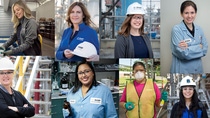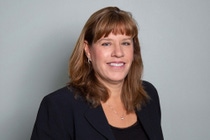Links to organizations/events associated with BASF manufacturing jobs
Media
BASF seeks to attract more female talent to its manufacturing sites.
Elizabeth Monroe was inspired to work in manufacturing at an early age – thanks to her father. He was a quality control chemist. She vividly remembers going to his take-your-daughter-to-work day and getting a tour of the manufacturing floor.
“They made bar soap and detergent, it was just exciting to see all the moving parts and the people and the speed,” she said.
Thanks to a few impactful math and science teachers and a mentor father, today Monroe is a site director for one of chemical company BASF’s manufacturing plants – managing 160 people, 14 of them women.
“It can be intimidating, because there are not too many women in the field, but no one was ever unwelcoming in my experience,” Monroe added, recalling her 15-year journey at BASF. “If I hadn’t had that early exposure, I don’t know if it ever would have occurred to me to choose such a career path.”
Kristen Pforr grew up in the Midwest on a farm. She liked working with her hands, being active and solving problems. After obtaining degrees in Chemistry and Chemical Engineering, working in manufacturing was the natural step for her. She started out as a process engineer at a manufacturing site in Texas. Today, she is the Vice President of Operations for Chemical Intermediates at BASF with around 350 employees reporting to her. She’s had two female bosses among several males in her career and has hired several more women as part of her direct leadership and extended leadership team. Yet, she agrees that the field is still very much male dominated, and she understands why women don’t run out to get manufacturing jobs.
“It can be uncomfortable – being the sole female in a predominantly male environment – you look around and you see you’re the only one, you question yourself – do I really belong here?” she said. “That’s why we talk a lot about leaning in and taking a seat at the table, because the seats can be there, but you have to be willing also to endure the discomfort of pulling up and taking that seat.”
Elizabeth Monroe, Beaumont Site Director, BASF
Kristen Pforr, Vice President Operations, Chemical Intermediates, BASF
The days of female hardships in male-dominated workplaces, such as in films Norma Rae (Sally Field) or North Country (Charlize Theron), may be long behind us in terms of laws and perception, but the truth remains, women are still very much underrepresented in the manufacturing fields. While females make up half of the working population (47.5%), they make up only one third of the manufacturing workforce in the U.S., according to the United States Census Bureau.
Although BASF has women working in a variety of roles, including site leaders, engineers, operators, instrument technicians, lab technicians and more, the German company’s female composition in North America has increased slightly, from 16% in 2019 to 17% in 2020.
To raise female presence in all trades, across the board, the company announced last year that it has set a goal of employing 30% of women in leadership roles worldwide by 2030 in order to support inclusive cultures and work environment.
To help make this come to fruition, at least on the manufacturing end, BASF’s Manufacturing Community Steering Committee created a Women in Manufacturing (WIM) Steering Team in 2015. This team was created to help position BASF as an industry leader in attraction, selection, development, inclusion, and retention of women in manufacturing jobs. Among other support programs, there’s also flame (Female Leaders Advancing Manufacturing Excellence), a development initiative for women working in manufacturing at BASF. Then, there is the North American Apprenticeship Development Program (NAADP), whose mission is to develop a pipeline to meet future talent needs for a skilled and diverse technician workforce with an emphasis on attracting more females to these roles.
The chemical company is also a member of Women in Manufacturing Association. Additionally, BASF supports the Manufacturing Institute’s STEP Ahead Awards, which recognize women who work in science, technology, engineering and production careers and exemplify leadership within their companies.
Monroe and Pforr, both wives and mothers, agree BASF is a great place of employment for women, for several reasons.
“BASF’s values are in alignment with what women need, I think we have good leaders,” said Pforr.
“BASF is open to different perspectives; and in my experience, especially in manufacturing, there’s a lot of employee support in terms of those affected by hurricanes, flooding or managing childcare and virtual school while working during a pandemic,” said Monroe. “It doesn’t matter if you’re a man or a woman, if you feel that your company cares for you, then it’s going to be a place that you want to contribute to and grow.”
Monroe recalls when a male boss once told her that he knew several talented women who often second-guessed themselves, which she calls the ‘imposter syndrome,’ something that many women experience – a feeling of inadequacy and persistent fear of being exposed as a ‘fraud’.
“It’s important to recognize that you have a perspective, and a seat at the table, you are providing a value and a skillset,” Monroe concluded. “It’s vital to just be yourself in your leadership because you provide something that’s different. Be the change that you want to see in the world.”
To learn more about careers for women in manufacturing at BASF, click here.
Links to organizations/events associated with BASF manufacturing jobs
Published Feb. 8, 2021, by Anna Spiewak.
For media inquiries or to repurpose this article, please contact Lisa Brown.



